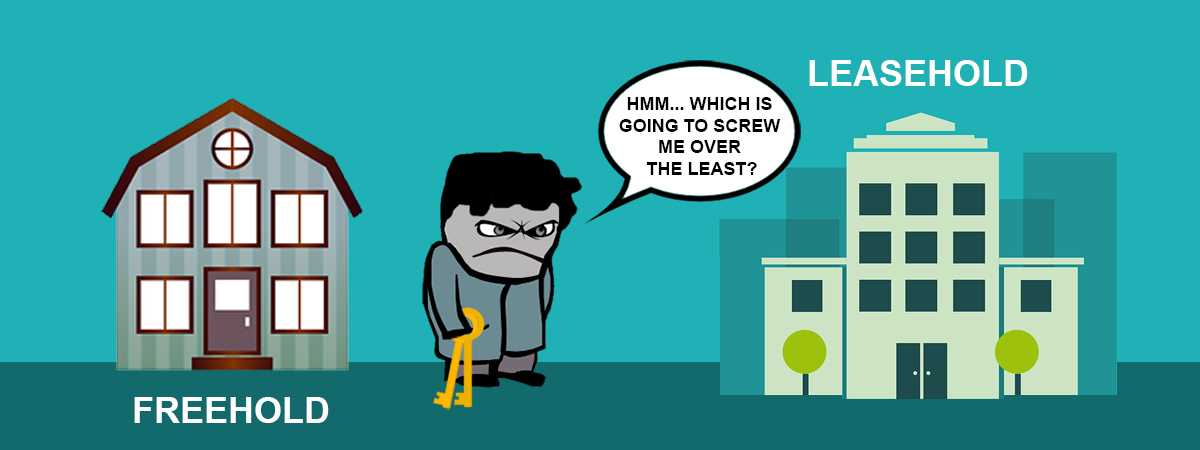
In short, leaseholds suck balls.
Allow me to explain how I came to that conclusion…
For someone in their early 30s (who could pass for their early 20s, and a late teen in dim lighting), I’ve been deteriorating like someone in their 80’s, and that’s demonstrated by LBC talk-show radio station often being the default ‘play mix’ blaring out of my speakers when I turn on my car ignition (which I’ve discussed a few times before).
As I infrequently do during my Friday evening travels, I recently found myself crashing into the middle of ‘The Property Hour‘ segment, hosted by Clive Bull and regular guest host, ‘Property Expert’ Kate Faulkner.
The premise of the show is simple: confused people call in to divulge their property related woes so they can benefit from expert advice. It must be said, many of the questions/scenarios make you realise how uncommon ‘common sense’ is, and how there isn’t a short supply of pettiness. God, the pettiness.
I’ve heard Kate on the show a few times before. I’ve always liked the cut of her jib. She’s got a good jib on her shoulders. An overall solid piece of jib.
This week she addressed a question regarding leasehold properties, specifically whether they’re good for BTL investments (this wasn’t one of those painfully stupid questions). The question jogged my memory and reminded me of where most of us have to start.
Yup, I’m about to smash n’ grab content from LBC again!
Are Leasehold Properties Good For Buy-To-Let Investment?
Good question, albeit rather primitive on the surface, and perhaps that’s why many buyers’ live to regret their decision- which makes it an extremely important question to ask BEFORE signing your life away or spending a single nugget.
I don’t want to get into the whole Freehold Vs Leasehold properties debate right now, because that’s been done and dusted. Right over here. If you need to get up to speed, do so, and then we can regroup to proceed. But to keep it overly simplistic for now, we can say that the question really boils down to this: House vs Flat, since most apartments/flats in the UK are leasehold, while houses are freehold.
Please note, the question is being answered from the perspective of buying leaseholds in TODAY’s market, in 2017 and the foreseeable future, when house prices are insanely high and the running costs of being a landlord is spiralling out of control due to all the red-tape.
Right, so let’s take a listen to Kate Faulkner’s answer…
(This was aired on the Thursday, 30th of March 2017)
Transcript, key takeaways & my backseat narration…
1) Does the lease allow letting?
The first question you need to ask!
Some leases do NOT allow you to sublet (technically, I think you’re always subletting if you let a leasehold property), so before buying a leasehold for the purpose of BTL, look for any restrictive covenants in the lease that do not allow subletting.
I’ll hazard a guess and say 1) many landlords are letting without having checked their lease (if that’s you, go check) 2) many landlords are knowingly breaching the terms of the lease. Ballsy.
2) Sinking fund
Many leases enforce a regular contribution to what is known as a ‘sinking fund’, which is a mechanism that helps cover any unexpected maintenance or repairs, like replacing the roof, which can run into tens of thousands of pounds.
The fund is generally beneficial for all leaseholders, because it helps spread maintenance costs proportionality, based on when each leaseholder purchased their lease. Without such a fund, you could end up paying an equal amount as all the other long-term leaseholders to cover the costs of major repairs, even if you only just purchased the lease. How demoralising.
You’ll probably want your lease to include a sinking fund. However, bear in mind, it will add to the running costs. Sad face.
3) Length of lease
Needless to say, the longer the lease, the better. You can get leases up to 999 years these days, but from my experience, most start their life with 99’ish years.
Problems can occur when the length of the lease approaches the 85 year mark. Not only do shorter leases dramatically affect property value, but also diminishes the saleability. Moreover, extending a lease to a more desirable duration ain’t free.
4) Service charge & Ground rent
Ground rent is the money that the leaseholder pays to the Freeholder for ‘leasing’ the land that the property sits on, which is usually a fixed sum and is paid annually. The service charge is payment for the communal services (such as maintenance of gardens and communal areas).
Despite popular belief, two different costs. Nonetheless, both contribute to ongoing running costs which most leaseholders are subject to.
I’ve heard some proper toe-curling stories when it comes to imposed service charges – nightmares that will make any landlord vomit – and many of the times the leaseholders are helpless to fight it.

Not only is it important to be aware of those costs before purchasing a leasehold property, but it’s equally as imperative to know how much they can increase by (which they often do). Sensible leasehold contracts will have cap the increases.
Basically, more complications and fees. You can see an overview of leasehold expenses on the GOV website.
5) Freehold or leasehold?
Kate does say that she ideally opts for freehold properties (presumably based on the points above). However, she also mentions…
6) Leasehold = Bargains
You can get some bargains when buying leasehold if you know what you’re doing (I’d personally make the same argument for freehold, you know, “if you know what you’re doing”).
I’ve found that leasehold properties in urban areas are generally cheaper than freehold. That’s probably what makes them more appealing on the outset. In many cases, only on the outset. It’s usually a painful tumble when you realise that you didn’t include the ongoing costs associated to leasehold properties when calculating the yield.
7) The Freeholder
The problem with leasehold is that it’s more restrictive, because you are effectively renting space from another landlord (the freeholder). So the value of your investment is only as good as the freeholder. However, bear in mind, freeholders can change, and you may get lumbered with a dud.
I’d actually go one step further and say a leasehold is only as good as all its leaseholders, which means there are suddenly a lot more moving parts, and therefore greater margin for failure. If you end up with a bag of idiots… painful. Painful.
8) Leasehold properties can be more problematic
Generally, there are potentially ‘all sorts’ of extra problems that come with leasehold properties.
My final thoughts…
I liked Kate’s response, because it was pretty much inline with my sentiments. Although, I’m more pessimistic about leasehold properties than she appears to be.
While Kate doesn’t directly answer the question of whether leaseholds are a good (or bad) BTL investment, she does highlight key areas of concern, which you don’t encounter with freehold properties. So you can make of that what you will and draw your own conclusions.
Personally, I’d rather shove my money into a woefully pathetic Savings Account rather than mix with leaseholds. The restrictions, extra ‘ongoing’ costs and all the communal politics that often pop up – it’s just all too much for me. The first day you get a leak from the flat upstairs is the day you regret ever being a leasehold landlord!
Plus, the idea of renting someone else’s land doesn’t go down well with me. It’s probably an ego thing. And another issue for my therapist to grapple with.
I know a mega buttload of landlords own leasehold properties, which is why this blog post might cause unwelcome irritations.
Maybe you’re a leaseholder, sitting there thinking I’ve made it sound worse than it is… while casually polishing the dust off your Patek Philippe. Fair play. But I’d bet my left nutsack that most of those landlords are benefiting simply because they bought at a time when it actually made sense (i.e. donkey years ago). In today’s market? The odds seem boldly stacked against leaseholds. But to clarify, all the points mentioned are only aspects to be aware of, and mostly *my* reasoning for staying clear, and I’m not saying leaseholds can’t be fruitful investments.
That said, I have a feeling that many new landlords naively opt for leaseholds because they fixate on the lower ‘cost of entry‘, while ignoring the overall complications and running costs! That can be fatal.
If you take away anything from this blog post, let it be this: 1) Physically, I’ve aged extremely well 2) Leaseholds generally come with additional costs and politics, so do the proper math before biting the bullet.
Finally, thanks to The Faulkner for the ride (which she has no idea she was a part of)!
As always… thoughts, opinions, shared experiences.. all welcome!
Landlord out xo
Disclaimer: I'm just a landlord blogger; I'm 100% not qualified to give legal or financial advice. I'm a doofus. Any information I share is my unqualified opinion, and should never be construed as professional legal or financial advice. You should definitely get advice from a qualified professional for any legal or financial matters. For more information, please read my full disclaimer.


 Landlord Products / Services
Landlord Products / Services




























I have a number of properties and the only one I have a problem with is the leasehold one. It has been a nightmare.
- communal politics
- a lease that says no pets that the ground landlord enforces
- a lease that says no sharers
- Managers who employ expensive contractors, risk assessment consultants before doing anything, requiring me to pay for other peoples flats as windows are a communal charge
- a management company that won't allow building work done before 9 in the morning
- not being allowed to have anything outside the flat even though only flat on the floor due to fire regulations
- complaints from other occupants in the building about lifestyle issues
- annual tree inspections in the communal garden on trees which have TPO's
- large management costs
etc etc
When I bought the long leasehold flat I thought no more problems with roof etc instead I receive constant reports from consultants on minor issues. Leasehold never again.